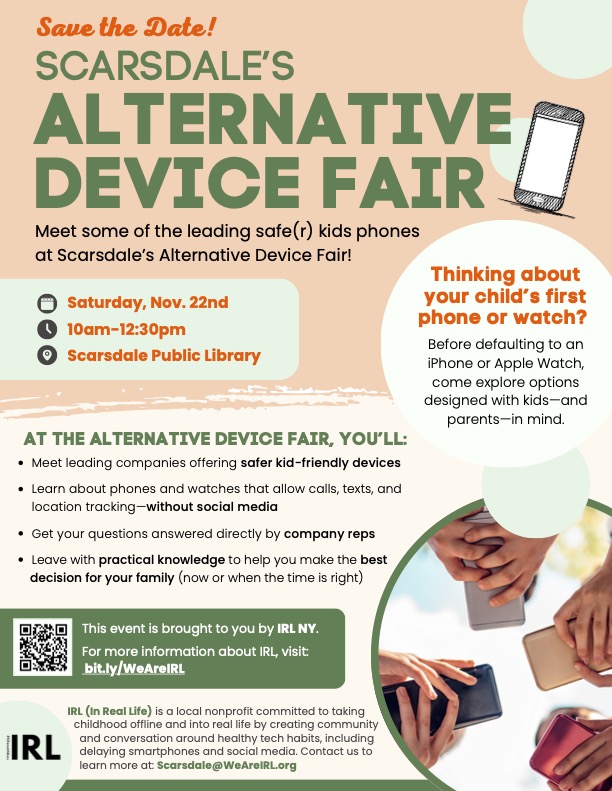Boys Volleyball Team Onto the State Playoffs
- Details
- Written by: Dave Taber
- Hits: 596
 Junior Griffin Lee (2) and Senior Jacob Kashanian (21) rise together for a block attempt.The Scarsdale High School Boys Volleyball Team faced Clarkstown South in the Division 1, Section 1 Championship on Thursday, November 13, at the Westchester County Center. The Raiders battled throughout the match — especially in the third set, where they held two set points — but the Vikings ultimately prevailed, winning 3–0 to claim the Section 1 title.
Junior Griffin Lee (2) and Senior Jacob Kashanian (21) rise together for a block attempt.The Scarsdale High School Boys Volleyball Team faced Clarkstown South in the Division 1, Section 1 Championship on Thursday, November 13, at the Westchester County Center. The Raiders battled throughout the match — especially in the third set, where they held two set points — but the Vikings ultimately prevailed, winning 3–0 to claim the Section 1 title.
The good news for Scarsdale is that the team received an at-large bid to the state playoffs, keeping their state title hopes alive. The Raiders next play on Saturday, November 22, at Roberts Wesleyan University in Rochester, NY.
Photos by Dave Taber of Shots of the Game
To see more game photos and/or download photos, please visit https://www.shotsofthegame.com/
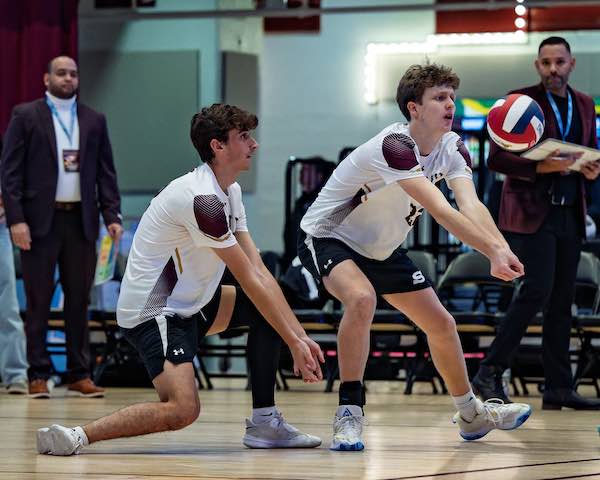 Ian DiLorenzo (22) focuses on his dig as Noah Kent (12) backs him up.
Ian DiLorenzo (22) focuses on his dig as Noah Kent (12) backs him up.
 Junior Ian DiLorenzo (22) drives a spike across the court.
Junior Ian DiLorenzo (22) drives a spike across the court.
 Senior Noah Kent (12) drops low for a clean dig.
Senior Noah Kent (12) drops low for a clean dig.
 Jacob Kashanian (21) celebrates after winning a big point.
Jacob Kashanian (21) celebrates after winning a big point.
 Griffin Lee (2) sends the ball back over the net to keep the rally alive.
Griffin Lee (2) sends the ball back over the net to keep the rally alive.
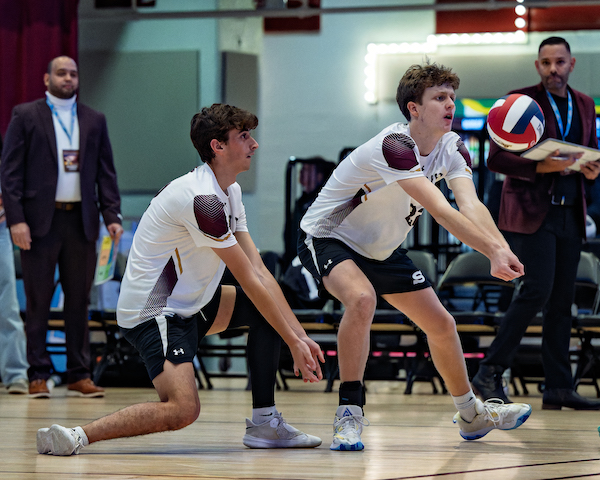 Ian DiLorenzo (22) focuses on his dig as Noah Kent (12) backs him up.
Ian DiLorenzo (22) focuses on his dig as Noah Kent (12) backs him up.
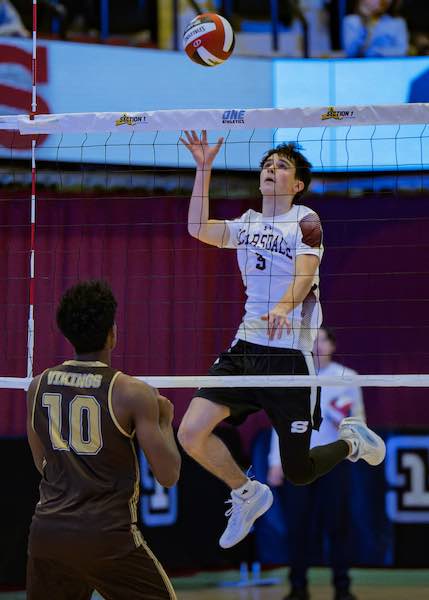 Senior Tristan Fourgoux (9) gets the ball back over to extend the play.
Senior Tristan Fourgoux (9) gets the ball back over to extend the play.
 Noah Kent (12) elevates for a sharp spike to win the point.
Noah Kent (12) elevates for a sharp spike to win the point.
 Ian DiLorenzo (22), Tristan Fourgoux (9), and Ryosuke Shindo (15) celebrate a big Scarsdale point.
Ian DiLorenzo (22), Tristan Fourgoux (9), and Ryosuke Shindo (15) celebrate a big Scarsdale point.
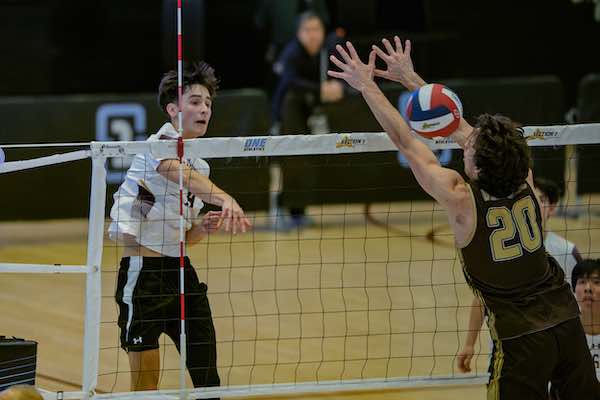 Tristan Fourgoux (9) attacks with a strong spike.
Tristan Fourgoux (9) attacks with a strong spike.
 Junior Ryosuke Shindo (15) sets the ball.
Junior Ryosuke Shindo (15) sets the ball.
Cooking with Affection at Bistro de Ville
- Details
- Written by: Joanne Wallenstein
- Hits: 2235
 There’s a little corner of Paris on Summerfield Street in Scarsdale. Opened by Scarsdale residents in September 2023, Bistro de Ville was an instant hit with locals who liked the warm atmosphere, the delicious French fare and greetings from an owner who knows your name.
There’s a little corner of Paris on Summerfield Street in Scarsdale. Opened by Scarsdale residents in September 2023, Bistro de Ville was an instant hit with locals who liked the warm atmosphere, the delicious French fare and greetings from an owner who knows your name.
We wondered what it takes to open a successful new restaurant in Westchester and spoke to Carol Napadensky about her background and what it takes to host a bistro with style. Here is what she shared:
What was the genesis for opening a French bistro in Scarsdale? How did you choose the location and concept?
We are Francophiles at Heart! Kevin, my husband is a Classically Trained French Chef and we have always dreamed of bringing traditional French Bistro to our own neighborhood. When this opportunity on Summerfield Street was presented to us with a fully operational restaurant already in place we felt it was a sign. We set out to create a place where community, food, and friendship come together close to home, but with the Heart of Paris. That’s how Bistro de Ville was born!
Tell us about yourselves—is this your first restaurant? Are you local residents?
We have lived in Scarsdale for 15 years while raising our two children. When we first moved to Scarsdale, my sister and I ran a small Personal Catering Company in which we provided great experiences and dinners to local residents. For the last 10 years-- and still now -- I am a real estate agent with Julia B. Fee Sotheby’s Realty. These experiences have given me the opportunity to meet and befriend so many of the wonderful people of Scarsdale, who over the years have always encouraged us to follow our dream.
Before starting a family, I got my start as a cook under Bobby Flay at Mesa Grill. After that I moved on to the world of pastry and desserts in New York City at two iconic French restaurants, La Côte Basque and La Grenouille. Those restaurants unfortunately have been lost in time, but our guests are always fascinated by the stories of those “extinct” culinary roots.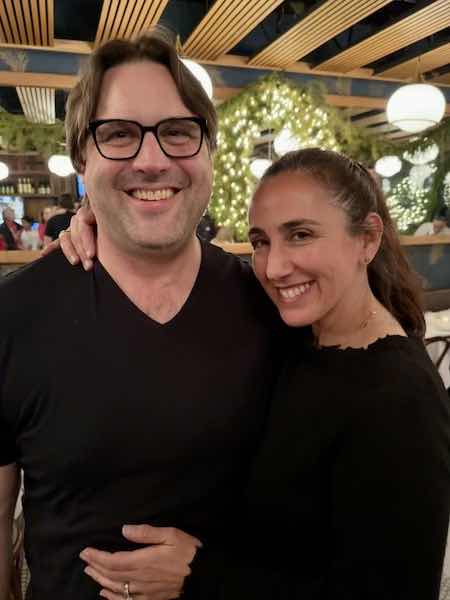
Food has always been at the center of our lives both professionally and at home so opening Bistro de Ville felt like a natural extension of who we are.
Who is the chef? Where did he work before?
My husband Kevin also trained in traditional French kitchens such as at La Côte Basque, La Grenouille, Russian Tea Room, Quatorze Bis and others. He is the current chef/partner of Bistro de Ville, Br’ers BBQ and the chef at Purdy’s Farmer & the Fish. Kevin and I develop the menu at Bistro and oversee the kitchen.
How did you design the menu?
Our cuisine starts with a foundation in classical French technique, with respect for tradition but with a modern twist shaped by our chef experiences and world travel. We cook the food we love to eat! Simple, soulful dishes all done well! We follow the seasons, work with local farms (including ours at Purdy’s) and local vendors as much as possible and always remain true to the generosity and elegance of the French bistro spirit. What are some customer favorites?
What are some customer favorites?
Guests love our French onion soup, roast duck, steak frites, duck liver mousse, escargots, and our warm, fresh baguettes. Desserts like chocolate mousse, seasonal tarts, and clafoutis are very nostalgic for many people. There’s always a dish that reminds someone of Paris or a special moment in their lives.
Why do you think you’ve been so successful, especially in such a challenging industry?
This restaurant is personal. It’s not just a business, it’s our home, our friends, our community. People feel that when they walk in. We’re here every day, we know our guests by name, and we cook with real affection. I think that authenticity is what makes us different.
What are some of the newest menu items for the fall?
What’s important for us about any items on the menu is that they are fresh and in season. We change the menu many times throughout the year. While the main item on a dish like the duck will stay on the menu, we will change what we serve with it. For instance, we have had Black Misson figs on the duck through the summer into the fall and now we will change that to gooseberries and braised endive through the winter and change again in the spring. The ratatouille with  eggplant, zucchini and gold bar squash will be replaced with honey & harissa roasted carrots. We stay true to French cuisine and only cook what is in season with the ingredients that are readily available to us. While also considering our guests dietary restrictions such as gluten, seafood and dietary choices. We have many options on our menu that are vegetarian if not vegan.
eggplant, zucchini and gold bar squash will be replaced with honey & harissa roasted carrots. We stay true to French cuisine and only cook what is in season with the ingredients that are readily available to us. While also considering our guests dietary restrictions such as gluten, seafood and dietary choices. We have many options on our menu that are vegetarian if not vegan.
Are you planning anything special for the holidays?
Yes we have a few events planned for the end of this year. Every year on the third Thursday of November is Beaujolais Nouveau. A celebration of the season and the fall harvest. This is the first wine released from the harvest. We are presenting Beaujolais Nouveau Wine with delicious regional specialties such as Foie Gras, Bœuf Bourguignon, Jambon Persillé and poached pears.
In December We are planning a special holiday wine dinner. This will not be a traditional multi course menu paired with wine. It will be more of a social, cocktail style evening a “Tour de France” if you will. Showcasing the food and wine of France from multiple different regions.
And of course, we will offer a special Christmas Eve or “French Réveillon” & New Years Eve prix fixe menus, special for the evenings on those holidays. We continue to offer live music during Sunday brunch. We have an eclectic bench of musicians we rotate through on a weekly basis. We are always promoting the live music and all future events on our Instagram @bistrodeville
Do you host private events?
Yes we welcome private events. Intimate celebrations, birthdays, bridal showers, corporate dinners. Guests love that it feels like a Parisian salon. Warm, elegant, and intimate. Anyone interested in hosting a event, can reach out to us at [email protected]. Is there anything else you’d like to add?
Is there anything else you’d like to add?
I have discovered a new passion: all of the flower arrangements for the dining room and events are done by myself personally and I would like to think this new hobby/passion may grow into its own business one day. Les Fleurs du Bistro de Ville, By Carol!
Bistro de Ville has brought us exactly what we hoped for, a place where we cook for the people we care about, close to home. It’s our dream, shared with our community. “Once a Chef forever a Chef.”
Bistro de Ville
185 Summerfield Street
Scarsdale, NY 10583
(914) 574-6364
www.bistrodeville.com
The Prudent Thing to Do: Keep New Yorker's Tax Dollars in New York
- Details
- Written by: Joanne Wallenstein
- Hits: 1072
 (This is the opinion of Scarsdale10583 Publisher Joanne Wallenstein)
(This is the opinion of Scarsdale10583 Publisher Joanne Wallenstein)
If our nation’s President was a student at Scarsdale High School he would be suspended.
Imagine your child making a video depicting feces being poured atop the high school cupola? What an image! Would the posting of the video break the law? Maybe not. But it would fly in the face of public decency. And that’s enough reason for the high school administration to take action. They don’t need a statute to know what’s indecent.
But it’s not only social norms of decent behavior that our President has violated. Beyond running roughshod over orderly government practice, the President’s administration has broken the contract between the federal government and the states to disburse funds allocated by Congress as specified in the federal budget.
In the past few months we’ve seen a vengeful President overstep his authority to withhold funds appropriated for healthcare, scientific research, education, transportation, infrastructure, the World Trade Center Health Program for 9/11 survivors and even food assistance. His latest move was to cancel funding for two important transportation projects for New Yorkers: the extension of the Second Avenue Subway and the Gateway Project, two tunnels connecting New York and New Jersey.
While New Yorkers continue to fund the federal government they are spending our hard earned dollars to build detention centers, fund the Argentinian government, purchase not one ,but two airplanes for Secretary of Homeland Security Kristi Noem and to send the National Guard into places they are not needed. None of these moves are authorized by Congress.
In 2023, the last year these numbers were reported, New York sent $89 billion more to the Feds than we got back and this year, with all of these cuts, the deficit for 2025 is sure to grow. What are we getting here for our federal tax payments, which account for 50% of my households’ tax bill?
The only evidence of the federal government that is visible here is the invasion of ICE agents, upsetting our economy and frightening the people who do the hard work to keep us afloat.
At this rate, New York will be in serious trouble in just a few months. Our coffers will be empty, unemployment will rise, our healthcare system will face challenges as will our schools.
What’s the solution? Here’s an immodest proposal:
Stop the flow of our money to a federal government that is disobeying the law. Send our federal tax dollars to Albany instead. The Governor and the State Legislature can recoup the funds that were promised to us and allocate them to all the federal programs that were cut.
Close the Federal IRS offices in the state – we don’t need them. Send our federal tax dollars to the NYS Department of Taxation and Finance instead. And if the federal government decides to sue us, bring it on. We can defy court orders just as easily as our fearless leader. He doesn’t respect the rule of law, so why should we? Keep our tax dollars in New York until this situation is resolved. It’s the prudent thing to do.
Let’s stop enabling a man with the mentality of a 12 year-old bully to divert our funds into his own pocket. Do what you would do to your own recalcitrant teen.... cut off his allowance.
Parents Urge Alternatives to Smartphones at Upcoming Device Fair
- Details
- Written by: Joanne Wallenstein
- Hits: 1019
 Two parents came to the mic at Village Hall on October 14 to discuss their initiative to change technology norms in Scarsdale. As founders of IRL NY’s Scarsdale Chapter they are advocating for a tech reset.
Two parents came to the mic at Village Hall on October 14 to discuss their initiative to change technology norms in Scarsdale. As founders of IRL NY’s Scarsdale Chapter they are advocating for a tech reset.
Ariana Green explained: “When I worked as an attorney for tech companies, I learned that many Silicon Valley executives opted not to give their own kids devices, or later, social media. What they knew about what was best for their own kids – their brains and their emotions – is what the general population is finally getting to wise to now.
Lisa Berman and I started the Scarsdale chapter of IRL NY because we want to join other communities around the nation in a tech reset.
We are aligned with Scarsdale alum Jonathan Haidt’s widely popular book, The Anxious Generation, which urges parents to come together and support each other in setting new technology norms.
Haidt suggests that families agree to wait until kids are at least 16 for social media. For parents to track and communicate with kids before then, there are now an array of alternative devices designed with kid safety in mind. Most of these are only sold online, but on November 22, we are hosting Scarsdale’s first Alternative Device Fair at the Scarsdale Library, and vendors are flying from throughout the country to allow us to interact directly with the devices, understand their features and ask questions face-to-face. Brands coming include Bark, Gabb, Pinwheel, Troomi, and Lightphone, among others.
Social science research shows that when 25 to 30 percent of a community makes a change, norms can change. If enough families gift their kids alternative devices instead of smartphones, and if we urge people to slow down on iPad text groups and the like, our community can shift. We can help our kids avoid a life on addictive devices and social media for that much longer, as their brains are wiring.
We are inspired by the grassroots movements popping up in towns throughout the country and chose to join our neighbors in bringing IRL to Scarsdale. There are chapters in Rye, Larchmont, Mamaroneck, Rye Neck, and Nyack, with more on the horizon. We are part of the executive committee strategizing for our region, and we are inviting the River Towns, New Rochelle, Yonkers and beyond to join us at our device fair and to join our movement.
I have come to believe that the best thing I can do for my kids – other than trying my hardest in the day-to-day of parenting – is to ignite a local push to meaningfully change how we operate here with respect to tech.
If each of uses our own circle of influence to push for change, fewer of us will have to hear from our kids: “But everyone’s getting phones with social media in sixth grade.” Or if we do hear that line, we can soon confidently tell them: “That’s just not true.”
Lisa Berman outlined additional initiatives the two are working on with school leaders and parent organizations to spread the word. She explained, “We are encouraging families to think critically about when they are giving their kids smartphones and access to social media. Right now, many children in Scarsdale get their first smart phone or watch in elementary school or early middle school. We are interested in pushing back that norm so that more families are waiting until high school or 16 years old to give their children access to social media and smart devices.”
Learn more and sign the pledge here:
How Can the Government Shutdown Affect You?
- Details
- Written by: Joanne Wallenstein
- Hits: 1238
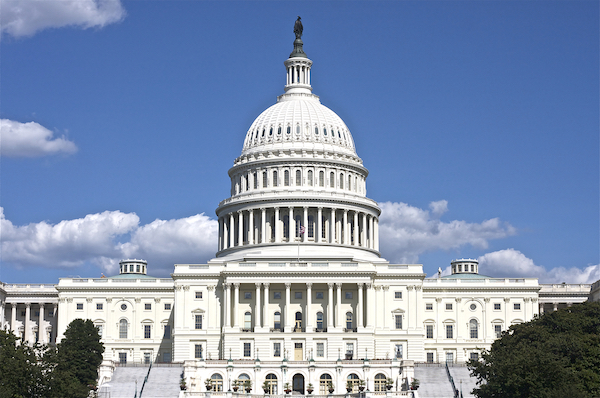 We’ve been waiting to see if and how the dysfunction in Washington will affect us here in New York. The Federal Government regulates many important services that are now in peril due to budget cuts and the government shutdown, If you have questions about how your healthcare, social security, postal delivery, air travel and more might be impacted, see the FAQ below from Congressman George Latimer with information on what to expect.
We’ve been waiting to see if and how the dysfunction in Washington will affect us here in New York. The Federal Government regulates many important services that are now in peril due to budget cuts and the government shutdown, If you have questions about how your healthcare, social security, postal delivery, air travel and more might be impacted, see the FAQ below from Congressman George Latimer with information on what to expect.
Another threat to New Yorkers is the possiblity of skyrocketing health insurance premiums due to the expiration of tax credits for the Affordable Card act in the budget bill before Congress. An email from Senator Kristen Gillibrand explains, "Without an extension, Affordable Care Act enhanced tax credits will expire at the end of 2025, causing 20 million Americans to see a sudden increase in their health insurance costs. This includes at least 1.6 million New Yorkers, who will face an average yearly increase of $1,360 in the amount they pay for their premiums, with people in some counties experiencing far greater increases. Gillibrand emphasized the immense strain that this will put on working families and the dire need for Republicans to work with Democrats to address the looming health care crisis and end the government shutdown. Enrollees in New York State are already receiving notices of premium hikes ahead of the start of open enrollment on November 1st, underscoring the importance of extending the subsidies immediately."
A county-by-county breakdown of the expected premium increases for the lowest-cost ACA plans can be found at gillibrand.senate.gov/trumphealthcareincrease.
Government Shutdown Information and Resources from Congressman George Latimer:
The federal government shut down on October 1, 2025. While the government remains shut down, my office will continue supporting NY-16's residents and will keep you informed as Congress works on a plan to fund and reopen the federal government.
Are you wondering what to expect during a government shutdown? Are you seeking services through the federal government that are unavailable due to the shutdown? Are you an impacted federal employee seeking support? My office has gathered answers to frequently asked questions about the government shutdown. As negotiations to reopen the government continue, my team will keep this webpage with the latest information for people impacted by the shutdown.
Frequently Asked Questions
I have a pending case with a federal agency through your office. How is that impacted by the shutdown?
My staff will continue to submit inquiries to federal agencies on behalf of constituents, but it's important to note that responses will vary from agency to agency. Some agencies may process cases and others may not. Delays should be expected. Caseworkers on my team will provide constituents updates on their casework as soon as they are available.
Can I still book tours through your office for my upcoming trip to Washington D.C.? What happens to the tours I have already booked?
During a government shutdown, the Capitol Visitor Center will be closed and there will be no public tours of the U.S. Capitol. All Library of Congress buildings, the U.S. Botanic Garden, the White House, the National Archives, the U.S. Supreme Court, the U.S. Treasury, and the FBI Building will also be closed to the public. Smithsonian museums and the National Zoo are also closed.
If you have a tour scheduled through our office and have questions, please call 202-225-2464.
I would like to have a flag flown over the U.S. Capitol. Can I still purchase one?
No. The U.S. Capitol Flag Office will be closed during the shutdown and flag requests cannot be processed.
Will federal employees be paid for the days they are furloughed?
Yes, the Government Employee Fair Treatment Act requires retroactive pay for furloughed employees following the end of a government shutdown. Benefits such as health insurance continue during a shutdown furlough; however, federal employees may need to wait until they are returned to pay status before they can adjust their benefits.
What should government contractors expect?
Government facilities will be closed. No new contracts or modifications will be issued, and there will be delays in the acquisition process for procurements.
How will this impact members of the military?
All active-duty military personnel will continue to carry out their assigned duties, but they will not receive pay until the government reopens. Civilian personnel who are necessary to carry out excepted activities will continue to work, but they will not be paid. Any civilian personnel who are not considered essential will be furloughed.
I am on Medicare. Will I still be able to see my doctor?
Medicare benefits will continue during a government shutdown and healthcare facilities will still accept Medicare patients.
I am on Medicaid. Will I still be able to see my doctor?
Medicaid benefits will continue during a government shutdown and healthcare facilities will still accept Medicaid patients.
Will I be able to file a Medicare claim?
The Centers for Medicare and Medicaid Services (CMS) will experience staffing shortages, which will affect the agency’s ability to process claims in a timely manner. You should expect delays in the processing and payment of Medicare claims.
I am a health care provider and accept Medicare patients. How will I be affected?
Because CMS will experience staffing shortages, the agency’s ability to perform administrative tasks and process payments may be impacted. Providers may experience delays in receiving payments from Medicare.
Will Federally Qualified Health Centers continue operating?
Day-to-day operations will depend on the clinic’s individual funding and you should contact your preferred health center for further guidance.
My kids are enrolled in a Head Start program. How will they be affected?
Day-to-day operations will depend on the program’s individual funding. You should contact your child’s Head Start program for further guidance.
I rely on food from Meals on Wheels. How will I be affected?
Federal funding for Meals on Wheels programs could be delayed, which could force programs to reduce, delay, or suspend services altogether. Operations will vary at different Meals on Wheels programs. You should contact your preferred provider for further guidance.
If I have an interview or appointment with U.S. Citizenship & Immigration Services (USCIS), should I attend?
Yes. Biometrics appointments and interviews continue to be scheduled and conducted.
I have a pending application with USCIS. Will it continue to be processed?
USCIS will continue to operate as usual, including accepting and adjudicating immigration-related applications and petitions, but there may be some delays.
I am a business owner and am hiring new employees. Can I use E-Verify to verify a new hire’s eligibility to work?
No. E-Verify services will be suspended during the shutdown. However, federal law still mandates timely Form I-9 completion for new hires. Employers may continue to use the new alternate document review process for remote Form I-9 document verification during this time.
Can I apply for Transportation Security Administration (TSA) PreCheck and Global Entry?
TSA PreCheck applications will be accepted. However, Global Entry appointments for enrollment will be canceled.
I have flights booked for an upcoming trip. How will this affect my travel?
U.S. Customs and Border Protection (CBP) officials operating ports of entry are considered essential workers and will report to work. Ports of entry–-including airports–-will remain open, and inspection of noncitizens seeking to enter the U.S. will continue. In prior shutdowns, there have been some delays and long wait times at TSA checkpoints.
TSA agents are also deemed essential workers and will also be required to report to work and work without pay until the government reopens. Travelers should expect long wait times at TSA checkpoints.
Will the Federal Emergency Management Agency (FEMA) be operating if there is a natural disaster?
During prior shutdowns, most of FEMA's workforce was able to be dispatched to emergencies, but their funding source–the Disaster Relief Fund–is currently under extreme stress and in urgent need of additional funds. Employees at FEMA are not expected to be put on furlough; however, limited funds may impact FEMA’s ability to respond fully to an emergency. FEMA is currently limiting rebuilding projects in order to preserve funds for life-saving emergency response.
I have a trip planned to a national park in the near future. What should I expect?
All of the country’s 425 national park sites will be closed during the government shutdown. In previous shutdowns, some states have used their own funding to keep parks and other sites open—though visitor centers and restroom facilities were closed.
Will my mail still arrive?
In the event of a government shutdown, the U.S. Postal Service (USPS) will continue to deliver the mail.
Will post offices continue operating?
USPS operations will not be interrupted in the event of a government shutdown, and all post offices will continue to operate as usual.
Will I continue to receive my Social Security or Supplemental Security Income checks?
Yes. During a government shutdown, recipients will continue to receive their Social Security and SSI checks.
I lost my Social Security card. Can I request a replacement card?
Yes. The SSA will continue to issue original and replacement Social Security cards in the event of a government shutdown but expect delays due to decreased staff capacity.
I have a hearing scheduled. Will that still occur?
Yes. The SSA plans on continuing hearings and deciding cases as scheduled.
I submitted an application. Will that be processed?
Yes. SSA plans on processing applications for benefits, including appointments, corrections, requests for appeals, and post-entitlement actions.
For detailed guidance from the SSA on the potential lapse in Federal appropriations and resulting partial shutdown of agency operations, click here.
I have an upcoming international trip and need to request or renew a passport. What should I expect?
The New York Passport Agency will remain fully operational. Passport applications will be processed and emergency passport appointments will be honored.
For more information on how to request an emergency appointment contact our office at (914) 323-5550.
I am a United States citizen living abroad. Will the local United States embassy be open?
During the 2018-2019 partial shutdown, United States embassies remained open to some degree, but U.S. citizens living abroad should prepare for delays in any application or processing requests as staff furloughs may occur.
Please note, hours of operations and service impacts may vary at each facility. You can check which embassies and consulates may be impacted here.
Will VA clinics and hospitals continue operating?
Yes. You will still be able to get your prescriptions filled and make appointments with medical providers in the same way you did before the shutdown. All Veteran Health Administration (VHA) agencies will remain open and functional during a government shutdown.
I am a veteran. Will I receive my pension on time?
Yes. You will receive your pension checks on time.
I am a disabled veteran. Will I receive my benefits on time?
Yes. You will receive your disability benefits on time.
I am a veteran student who receives benefits under the GI Bill or the Veterans Educational Assistance Program. Will I continue to receive payments on time?
Yes. You will receive your GI Bill benefits on time. If you are under the Veterans Educational Assistance Program, you will receive your payments on time, as well.
Will I be able to use grants.gov to search for and apply for grants on behalf of my organization?
Grants.gov will remain operational and WILL provide limited assistance to applicants; however, response times may be delayed.
Will applications submitted through grants.gov be processed and reviewed throughout the shutdown?
This varies between different grant-making agencies and offices. Please contact your agency or office of interest for further guidance.
Will funding awards be announced during the shutdown?
Agencies that are closed during the shutdown will not announce awards.
Additional questions?
You can contact our office at 914-323-5550. My team is monitoring phones and will do all they can to help constituents find answers and resources.







